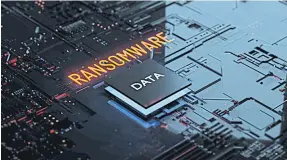As ransomware attacks continue to pose a significant global threat, the importance of proactive cybersecurity measures has never been more critical. Gregory Pickett, CEO of Hellfire Security and a renowned white hat hacker, emphasizes the need for organizations to stay vigilant through penetration testing and staying informed about emerging threats.
Hellfire Security, a consultancy specializing in cybersecurity assessments and managed security services, highlights the vulnerabilities within Thailand’s internet infrastructure, utilities, and corporate sectors. Pickett points out that many critical systems in these sectors are exposed due to remote access being enabled, which should ideally be restricted to internal access only.
“A solution-based engineering approach often leaves security measures as an afterthought,” said Pickett. “We know we need a firewall. We know that we need adequate protection. Then we try to take what we have to protect and try to fit them to the firewall.”
Critical Infrastructure Under Threat
Pickett underscores that sectors such as telecommunications, energy, finance, industrial manufacturing, and tourism require a more robust approach to cybersecurity than others. He suggests conducting threat modeling, which involves analyzing critical systems and data to develop a security strategy tailored to protect those assets effectively.
“By prioritizing a clear understanding of the threats and what requires protection, security solutions can be tailored to effectively address vulnerabilities,” he noted.
The Role of Penetration Testing
Penetration testing, according to Pickett, should be genuine and problem-based. This involves security professionals simulating real-world attacks to identify and exploit weaknesses. “A genuine penetration test involves actively trying to exploit vulnerabilities, like a real attacker would,” he explained. This approach moves from theoretical guesses to actual knowledge by demonstrating vulnerabilities in practice.
Smart Contract Exploits and Crypto-targeted Attacks
Pickett highlighted the specific risks associated with the cryptocurrency sector. Cryptocurrency exchanges and individual investors are prime targets for cyberattacks. Exchanges act as custodians of digital assets, making them attractive targets for hackers. Regular reviews and updates of security measures are crucial to counter these threats.
“Individual investors are targeted in various ways, including wallet attacks and social engineering scams like ‘romance scams,'” said Pickett. He also warned of smart contract exploits, where malicious code could potentially be inserted into decentralized autonomous organizations to steal funds.
The Growing Threat of Generative AI in Social Engineering Scams
The advent of generative artificial intelligence (GenAI) presents new challenges in cybersecurity. Attackers can use this technology to create realistic audio and video, making it harder to identify and avoid social engineering scams. Strong security policies, such as call-back verification, are essential to confirm the identity of any entity requesting sensitive information.
Ransomware and Emerging Threats
Ransomware attacks remain a top concern, capable of causing significant disruption and financial loss. Despite the lack of reported incidents in Thailand, underreporting of cyber-attacks might contribute to a false sense of security.
Pickett outlined two schools of thought on ransomware payments: paying if unprepared, to resume operations quickly, or not paying if prepared, relying on robust backups and a tested Business Continuity Plan (BCP) to rebuild systems and data.
In addition to ransomware, banking trojans persist as a significant threat, targeting online banking credentials. Emerging threats, such as biohacking, are also on the horizon, although Pickett considers them less likely in the near future.
Adopting Strong Cybersecurity Practices
Pickett advocates for strong passwords, zero-trust security principles, and maintaining separate devices for different purposes to improve overall cyber hygiene.
“By implementing these measures, individuals and organizations can significantly enhance their cybersecurity posture,” he concluded.
Gregory Pickett, Chief Executive of Hellfire Security, emphasizes the need for a robust approach to cybersecurity, particularly in critical infrastructure sectors such as telecom, energy, finance, industrial manufacturing, and tourism.

